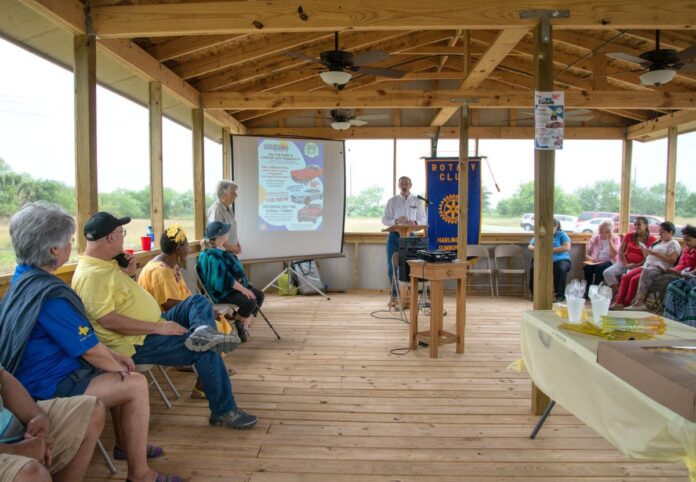SAN BENITO — Sister Margaret Mertens was there from the very beginning.
Mertens has been in the Rio Grande Valley since 1995. All this time she has worked serving those in need.
Since the inception of La Posada Providencia, Mertens, who was also the shelter’s director for 13 years, has been a staple at the shelter and a major proponent of its cause, welcoming the stranger.
During yesterday’s San Benito Chamber of Commerce weekly “Coffee With” session, Mertens told the story of La Posada Providencia and how it came to be.
It all started many years ago when she was a nun. Mertens was elected as a representative from a group in St. Louis.
From there, Mertens, a Missouri native, traveled to Germany where congregation officials encouraged her and a group of other nuns to go back to their home countries and look at the immigration situation.
“We ended up at Proyecto Libertad in Harlingen for a while,” she said. “We started with a little house and two refugees in 1989.”
From there, they moved to a house on Sam Houston.
Now, after several years, the shelter is located on the outskirts of town helping clients, Mertens said.
For those that don’t know, La Posada Providencia was founded and sponsored by the Sisters of Divine Providence, a ministry for people in crisis from around the world who are seeking legal refuge in this country.
The shelter staff provides a safe and welcoming home, mentors to promote self-sufficiency and cultural integration, and imparts values “which witness God’s providence in our world.”
“We help them learn as much as they can,” Mertens said.
All of the shelter’s clients are referred to them by the U.S. Bureau of Immigration and Customs Enforcement or local immigration attorneys.
They are in the legal process of seeking asylum, residency or some other legal alternative.
While they wait for their cases to advance through the court system, most of these individuals have no place to go and arrive at La Posada’s doorstep with nothing.
Staff members ensure they receive the necessary legal aid, health care, social services and other relocation assistance.
In addition, staff members help clients become familiar with the values, customs and social practices typical in the United States, including currency, personal finance and employment practices.
“They’ve got a nice place to be, they are taken care of and they know they are loved,” Mertens said. “So, we know we’re loved also.”
Many asylum seekers arrive in the United States with both physical and emotional scars from their journeys from places as far as Africa, Cuba, Mexico and Asia.
“We hear some of the horror stories,” Mertens said. “The stories of walking, walking and walking.”
Some of those stories will stick with Mertens forever.
“Some of the Africans have landed in South America and have walked through Central America, through Mexico and to the United States,” Mertens said. “Some even talk about seeing the dead bodies along the way that were left behind to die.”
As of now, their client census consists of women, children and men, from Cuba, Somalia, Eritrea, Guinea and Ethiopia.
Many of the African women, who are coming now, are coming in with just their children. Mertens said the husband usually gets detained and sent out of state to another detention center, prompting a three-to-five month wait to reunite.
Most are fleeing for various reasons, including civil unrest, fear of government control, political unrest and religious persecution.
The shelter sees a lot of mothers with children who have fled their home countries out of fear. Just recently, four women have given birth.
It hasn’t always been easy for La Posada. Mertens said the shelter faces a lot of backlash for what they do.
“We deal a lot with prejudice,” Mertens said. “People say they are coming in to take our jobs. What jobs are they getting? The ones that nobody else wants a lot of the time.”
SEEKING EXPANSION
With the need for services expected to grow, those at the shelter hope to expand in the future to accommodate more people.
Shelter leaders are currently asking for monetary pledges from people through their Circle of Hope Monthly Giving Club.
“You can be part of the ministry and included in all the prayers from the outside by supporting us, with prayer, donations or volunteering,” Sister Margaret Mertens said.
With the proceeds, Mertens hopes they can build a new building to house dorms, offices, a kitchen and other rooms. Willing participants can pledge as much money as they want or make a one-time pledge.
For more information on the Circle of Hope, contact the shelter at 956-399-3826.




